
Second Sunday of Easter - Year C
(Divine Mercy Sunday)
27th April 2025
Gospel reading: John 20:19-31
vs.19 In the evening of the same day, the first day of the week, the doors were closed in the room where the disciples were, for fear of the Jews. Jesus came and stood among them. He said to them, "Peace be with you,"
vs.20 and showed them his hands and his side. The disciples were filled with joy when they
saw the Lord,
vs.21and he said to them again,
"Peace be with you. As the Father sent me, so am I sending you."
vs.22 After saying this he breathed on them and said,
"Receive the Holy Spirit.
vs.23 For those whose sins you forgive, they are forgiven;
for those whose sins you retain, they are retained."
vs.24 Thomas, called the Twin, who was one of the Twelve, was not with them when Jesus came.
vs.25 When the disciples said,
"We have seen the Lord," he answered,
"Unless I see the holes that the nails made in his hands and can put my finger into the holes they made, and unless I can put my hand into his side, I refuse to believe."
vs.26 Eight days later the disciples were in the house again and Thomas was with them. The doors were closed, but Jesus came in and stood among them.
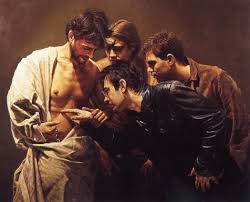 "Peace be with you" he said.
"Peace be with you" he said.
vs.27 Then he spoke to Thomas,
"Put your finger here; look, here are my hands. Give me your hand; put it into my side. Doubt no longer but believe."
vs.28 Thomas replied, "My Lord and my God!"
vs.29 Jesus said to him:
"You believe because you can see me.
Happy are those who have not seen and yet believe."
vs.30 There were many other signs that Jesus worked and the disciples saw, but they are not recorded in this book.
vs.31These are recorded so that you may believe that Jesus is the Christ, the Son of God, and believing this you may have life through his name.
*******************************************
We have four commentators available from whom you may wish to choose .
Michel DeVerteuil : Holy Ghost Priest, director of the Centre of Biblical renewal .
Thomas O'Loughlin: Professor of Historical Theology, University of Wales, Lampeter.
Sean Goan: Studied scripture in Rome, Jerusalem and Chicago and teaches at Blackrock College and works with Le Chéile
Donal Neary SJ: Editor of The Sacred Heart Messenger
*******************************************************
Michel de Verteuil
Lectio Divina, The Year of Luke
www.columba.ie
General Comments
Today's gospel reading, like all of St John's gospel, is an interweaving of several themes. It is not possible to follow up all the themes together; we must focus on one at a time, going deeply into it and allowing it to reveal some deep truth about Jesus, about ourselves and about life.
Here I invite you to focus on the apostle Thomas; this is in accord with the Catholic Church's liturgical tradition for the Second Sunday of Easter. Therefore, although the reading includes two of Jesus' resurrection appearances - both of them deeply moving - we stay with the second, the dialogue between Jesus and Thomas, and let the earlier appearance provide the context. We are free to identify either with Thomas or with Jesus, but not with both at the same time. We need to be clear on how we understand Thomas. The popular interpretation puts him in a bad light, as "doubting Thomas". This however is not the movement of the text, which culminates in Thomas' admirable act of faith, the most explicit in the New Testament - "My Lord and my God!".
We are more in accord with the spirit of the text, therefore, when we look at Thomas as a model of faith. He was right to insist that before he could believe in Jesus' resurrection he must see the holes the nails made in his hands, put his finger into the holes and his hand into the great wound made by the centurion's lance.
 Thomas teaches us the important lesson that we must not separate the resurrection from the cross, since we are called to be followers of Jesus. He also teaches us the truth of the Church and of our individual spiritual growth. We cannot live the life of grace, the "risen life", authentically unless we bear in our bodies the wounds of the cross. This means being conscious that we develop the capacity to love and to be loved only by dying to ourselves. Our wounds are also a constant reminder of our frailty, and that it is God's grace that raises us up to new life.
Thomas teaches us the important lesson that we must not separate the resurrection from the cross, since we are called to be followers of Jesus. He also teaches us the truth of the Church and of our individual spiritual growth. We cannot live the life of grace, the "risen life", authentically unless we bear in our bodies the wounds of the cross. This means being conscious that we develop the capacity to love and to be loved only by dying to ourselves. Our wounds are also a constant reminder of our frailty, and that it is God's grace that raises us up to new life.
St Paul's epistles show that the first Christians needed the corrective of Thomas' faith. They tended to relate with the risen Jesus without reference to his crucifixion. They forgot that they were called to be "followers of Jesus crucified", choosing to die with him so that they could rise with him (see especially 1 Corinthians 1).
We Christians fall into the same error today when our lives and our teachings proclaim an abstract "disembodied" Jesus, dispenser of graces and teacher of morality - we forget the historical person who was put to death for proclaiming the kingdom of God.
Thomas professes the true faith of the Church. We too must insist that the Jesus we follow is the true Jesus, the one whose risen body bears the wounds of Calvary.
Jesus is the model leader and spiritual guide. He is pleased to give Thomas the assurance he is looking for, and then challenges him to look forward to the day when he will believe without seeing - always in the Jesus who passes through death to resurrection.
The blessedness of believing without seeing came from the experience of the early Church. Jesus is not moralizing, but inviting Thomas - and us - to celebrate great people of faith, in our local communities and world-wide, who take up their cross with confidence in the resurrection.
As always in our meditation we must not limit ourselves to personal relationships. We celebrate the resurrection faith lived by communities, nations and cultures.
Prayer reflection
"You who remain ever faithful even when we are unfaithful, forgive our sins and grant that we may bear true witness to you before all men and women." ...Pope John Paul II, Service of Forgiveness, March 2000
Lord, we thank you for the moments of grace of this Lenten season,
when - as individuals and as a Church community -
we walked in the footsteps of Jesus by passing from death to new life.
We thank you in particular for the great day
when our Church publicly asked forgiveness from other religions and cultures.
We thank you Lord, for Pope St John Paul who, like Jesus with St Thomas, invited us 1. to see the holes that the nails of our arrogance and self-righteousness had made in the body of Christ, and to put our fingers into the holes,
2. to put our hands into the huge wound which our lust for power has made in Christ's side,
so that we could recognise how, just as you raised Jesus from the dead, you do not allow his Body, the Church, to remain in the tomb, but always raise her up to new life.
Lord, we thank you for the times when reconciliation rose and emerged triumphantly from the tomb of conflict:
~the spirit of dialogue between our Church and Jews, Muslims, Hindus, and African traditional religions;
~ the European Union created by former enemies; and our openness to new memberships
~the Good Friday agreement in Northern Ireland; and our need to be continuously patient with each other
~the peace process in the Middle East, Gaza, Lebanon in so much conflict these days on so many sides.
~ the sufferings of our near neighbours in Europe and our approaches to immigration.
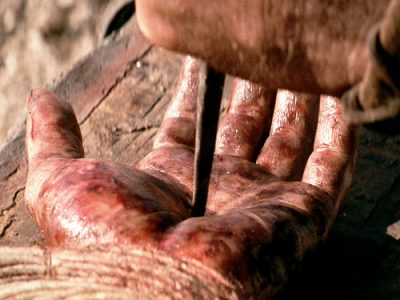
Lord, We pray that leading politicians and Church leaderships will to hear your voice calling on them all to remember those who have been hurt, who still have holes that the nails made in their hands
and can put their finger into the holes they made,
and unless they can put their hands into their side, they will refuse to believe.
Do not let us forget the terrible legacies of hatred and resentment which still has to be overcome; invite us to put our fingers into the holes made by nails, in our hands and sides other great wounds made by lances,
so that we can recognise with awe and wonder the spark of your divine life that is within us all.
Remind us too of those who worked for peace during the long years of conflict
when it seemed that they were working in vain.
How blessed were they who did not see
and yet continued to believe in your power to bring new life into the world.
"Whoever sees anything of God, sees nothing of God ." ... Meister Eckhart Lord, lead us to the blessedness of not seeing and believing.
"Go for broke, always try to do too much, dispense with safety nets, aim for the stars." ...Salman Rushdie
Lord, we thank you for friends, leaders and spiritual guides
who challenge us as Jesus challenged Thomas.
When we commit ourselves to a cause because we have tested its reality, they invite us to experience the blessedness of believing without seeing.
Lord, forgive us that we want to help those in need without sharing their pain,
we look for their resurrection but do not want to see their wounds:
~ young people have been deeply hurt and we serve them with pious exhortations;
~ we become impatient with those who continue to mourn the death of a spouse or a child;
~ we think we can restore a broken relationship by merely saying we are sorry;
~ we propose reconciliation between warring factions without acknowledging past wrongs;
~ we pray for peace in the world and do not agonize over its terrible injustices.
We thank you for people like Thomas who will not let us get away with easy solutions;
they insist that we must see the holes that nails have made in the hands of victims,
put our fingers into the holes and our hands into wounds that lances have made in their sides,
and only then believe that they have within them the capacity to rise to new life.
"We admitted to God, to ourselves, and to another human being, the exact nature of our wrongs." ...Step 5 in the 12 Step Method of Alcoholics Anonymous
Lord, when we are converted from an addiction to alcohol, drugs, speed, greed, power or sex,
we are so anxious to make a new start
that we try to forget the hurt which was at the root of our problem
~ the loneliness of our childhood
~ the sense of racial inferiority
~ our disabilities, our limits
~the fear of failure.
We thank you for sending us friends who insist that we must face the reality of the past.
We pray that like Jesus welcoming Thomas, we will invite them to put their fingers into the holes the nails have made
and their hands into our sides, so that they can walk with us in our new life.
*******************************************
Thomas O'Loughlin,
Liturgical Resources for the Year of Luke
www.Columba.ie
Introduction to the Celebration
In today's gospel, St John tells us to about an appearance of the risen Christ to the disciples gathered together on a Sunday exactly a week after Easter. John sets the appearance of Jesus on a Sunday because he knows that that is the day when Christians gather for the Eucharist - a practice that marks us out to this day. So like those disciples we have gathered here for 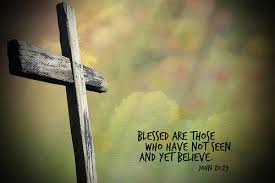 the Eucharist and Christ is now among us. We do not see him here today as on that first Sunday after Easter, but we recall the words Christ spoke on that occasion:
the Eucharist and Christ is now among us. We do not see him here today as on that first Sunday after Easter, but we recall the words Christ spoke on that occasion:
'Happy are those who have not seen and yet believe.'
Homily Notes
1. Belief in the risen Christ
is about sacramental living: 'happy are they who have not seen and yet believe: It is about dying and rising with Christ and becoming part of him, the church (CoI2:12) - the mystery of baptism; it is about gathering for his meal that transforms us from being individuals into being 'one body for we all share in the one loaf' (1 Cor 10:17) - the mystery of the Eucharist.
Baptism is the sacrament of entering, defining the bounds of the body; the Eucharist is the sacrament of sustaining, keeping the body in communion with Christ and between its parts.
Both these aspects of the Paschal Mystery keep recurring in the liturgy; both sacraments are inextricably linked with one another, and have been since the earliest days.
2. However, while we may preach these links as abstract items of doctrine, in the minds of most people in the gathering today the two mysteries are as chalk and cheese.
A 'christening' is something that belongs to infants and lots of people have the children christened because that's what you do - in all likelihood everyone in the congregation has been to one such ceremony. And, while it 'makes you a Christian' or 'a Catholic/ this is recalled primarily as a social bonding.
The Mass, by contrast, is something you go to each week 'if you are religious/ and it is about praying, getting communion (optional), and about 'getting thoughts of the week'. The ministry of preaching has to try to permeate these perceptions and reveal the deeper dimensions of religious practice, and so highlight the core content of Christian faith. Actions tend to break through the crusts of tacitly held perceptions with a far greater effect than formal verbal teaching or preaching (recalling that part of the perception of preaching for many is that it is irrelevant or 'goes over their heads').
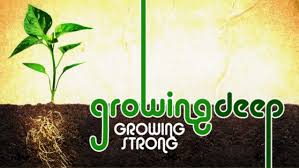
3. This could be done by having an infant baptism on this day the people who are practising and away from the parish on Easter Night may now be back and so can have their baptism today - at the Eucharist. Or, at the very least, by using today (as on Easter Sunday) the Renewal of Baptismal Promises instead of a declaratory confession of faith. This activity, the baptism or the renewal of promises, brings the mysteries together visibly - and not just on that most special night (the Easter Vigil) but at a regular Sunday gathering.
4. Then taking the cue from the gospel, that the Sunday gathering around the Lord's Table for the Lord's Supper has been a fundamental activity of Christians from the start (long before we had any of the writings now called the New Testament), then make the gathering a real, physical gathering around the table, with a real fraction, and communion under both species from one cup.
5. The fact that the assembly have to engage in the ritual in these unusual ways, not just listening to a homily, may help them engage with the mysteries they are celebrating
**********************************
3. Sean Goan
Let the reader understand
www.columba.ie
Gospel: John 19-31
In this very packed gospel many different facets of the Easter mystery are presented. Firstly, we note that Jesus appears to the community gathered on a Sunday, they rejoice at his presence and experience through him the gift of the Holy Spirit and are given a mission, sent just as Jesus himself was. That is as good a summary of what Sunday Eucharist is all about as you will ever find.
Joy in the presence of the risen Lord who gives us his peace so that we can continue his task of revealing God to the world. Thankfully Thomas is missing, because his refusal to believe means that the following Sunday we need to gather again, and once again as a community of faith encounter Christ among us. Now, by a wonderful irony it is Thomas who leads us in our appropriate response as we acknowledge Jesus as Our Lord and Our God.
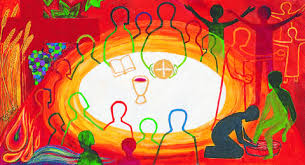
Reflection
Our readings for today, while they differ greatly in style, both reflect the extent to which the early church understood itself as totally dependent on the presence of the risen Christ within it. The first believers in Jerusalem were Jewish yet they stood out among their own people because of the witness that they offered. They impressed people with their care for one another and their prayerfulness. So too among the churches of the book of Revelation the faithful stood out from their contemporaries because, even when faced with persecution, their lives were characterised by hope and love. These are the fruits of Easter and remind us that we must celebrate as a community, and not only as individual the abiding presence of Jesus as our Lord and God.
[caption id="attachment_93815" align="aligncenter" width="277"] Early Christian Jews[/caption]
Early Christian Jews[/caption]
****************************************************
4. Donal Neary S.J.
Gospel reflections
wwww.messenger.ie/bookshop/
Only Faith
Jesus spoke in short sentences and summed up a lot of life in a few words. His final beatitude is in the gospel today - 'Blessed are those who have not seen and yet believe.' You can unpack that little phrase and in it you realise that faith is about things that cannot be proved, that it is not easy and that it brings a blessedness to life. It also includes ourselves - the ones of this year who still believe.
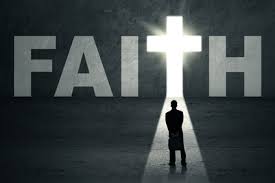
Something is only by faith when everything else fades off. Our loved ones die and only faith assures us that they are 'alive with God'. Only faith assures us that Jesus is present in the mystery of the bread and wine at our Mass. Only faith assures us that he is with us when two or three gather and only faith assures us that what we do for others we do for him. Faith assures us of some of the best things of life; finally that we come from God and go to God.
Thomas found difficulty with all this. Jesus dealt gently with him, pointing out the wounds of his body and inviting him to touch them. But Thomas never needed to touch the holes in Jesus' hands and feet. He was told that an even better happiness was to believe without touch or sight. He found faith now in the risen Lord, and the faith itself was Jesus final gift to Thomas.
We need to take time and let faith grow within us. This can be in prayer, in faith-conversation and in allowing ourselves sit quietly and be in the presence of God. In the busy world, this may be difficult, but no day is diminished by time spent in silence and in quiet, knowing we are richly blessed when we grow our faith in God.
Lord, I believe in your presence
with me and within me.
Strengthen my belief.
**********************************